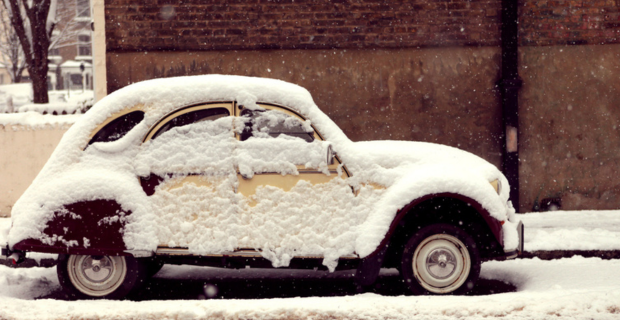Date Published: 2023/11/17
Read Time: mins
Can I Drive My Collector Car in the Winter?

When the chill of winter descends, a sigh is heard across the land… and it emanates from all the classic car owners who now face a difficult choice: Should I put my beloved collector car away for the winter or take on the additional risk of motoring through the ice and snow?
Unless you live in BC’s temperate climes, you likely face this dilemma every November. While (of course) it’s technically possible to brace the low temperatures, dark skies, heavy snow, and slick streets, most collector car owners try to avoid the roads altogether during this time of year.
Winter driving poses several unique threats to classic cars. Here’s why tucking your collector away for the season is better than taking the risk.
Road Salt: Corrosion and Rust
We're grateful for road salt and the crews working hard to spread it, making our roads safer for winter driving. But this safety measure is simply bad news for cars.
Road salt lowers the freezing point of water, essentially melting ice that coats the roadways. This allows tires to connect with the road rather than slide across an icy sheet's top.
While this is great news for winter driving safety, it's bad news for car owners who care about their vehicles. Why? Because salt is corrosive and accelerates every car owner's nightmare: rust. Repeated exposure exacerbates the problem, leading to more rust and more damage.
Worst of all, salt tends to get kicked up into the undercarriage, where it's not easy to see. Add water from wet roads into the mix, and you've got a recipe for problems that may include damage to subframes, coil springs, exhaust systems, mufflers, and even hydraulic brake leaks.
If you must drive through salt, prevent damage by:
- Rinsing after driving, paying particular attention to the undercarriage
- Parking in a heated garage
- Using fans to dry the undercarriage quickly
- Applying rust-preventative paint to the undercarriage each year
- Waxing every other month
- Ensuring all fittings and seals are tight
You've spent so much time, money and effort working on your car. Please don't risk it all with road salt exposure.
Moisture Damage
It’s no secret: Moisture and classic cars don’t mix. If the area where you live experiences ice and snow, you have to take steps to prevent moisture damage. Too much can corrode your metalwork, rust out components, cause vinyl to crack, harm leather, destroy your electronics, and more.
Some of the same steps that fight road salt damage will help prevent moisture problems, like storing your car in a heated garage, using fans to speed drying, and checking that seals are tight.
To prevent further moisture damage, you can:
- Invest in a dehumidifier or moisture absorber and empty it frequently.
- Regularly examine your car’s interior and exterior for dampness
- Never leave wet items or trash inside your car, as they can lead to interior condensation.
- Make sure drain holes on the sunroof or windscreen panels are free and clear.
- If you have air conditioning, run it in winter as it acts as a dehumidifier.
The best choice is to leave your car safely stored over the wet winter months.
Proper Storage
And speaking of storage, doing it right reduces the risks winter poses to your collector car. We’re not simply talking about the rust, corrosion and moisture… we’re also taking the increased risk of collision by leaving it parked somewhere unsecured.
These winter storage tips can help:
- Park in a heated garage
- Wash and wax your car before parking it for the winter
- Change all fluids and add fuel stabilizer
- Use a dehumidifier, silica packs or boxes of baking soda to absorb excess moisture and prevent condensation
- If you do take the car out for a drive, immediately wash and dry it thoroughly before re-parking
When it comes to winter driving and collector cars, one thing is for sure: Patience is a virtue. Though you’ll miss driving your car for a few months, winter road conditions pose a significant risk.
From the increased possibility of fender bends to the damage caused by road salt and excess moisture, it makes more sense to store your car through the winter months safely.
If you have any questions regarding your collector car insurance policy, feel free to give us a call at 1-844-929-4768. Interested in getting a quote, visit the Orbit Insurance Services website today.